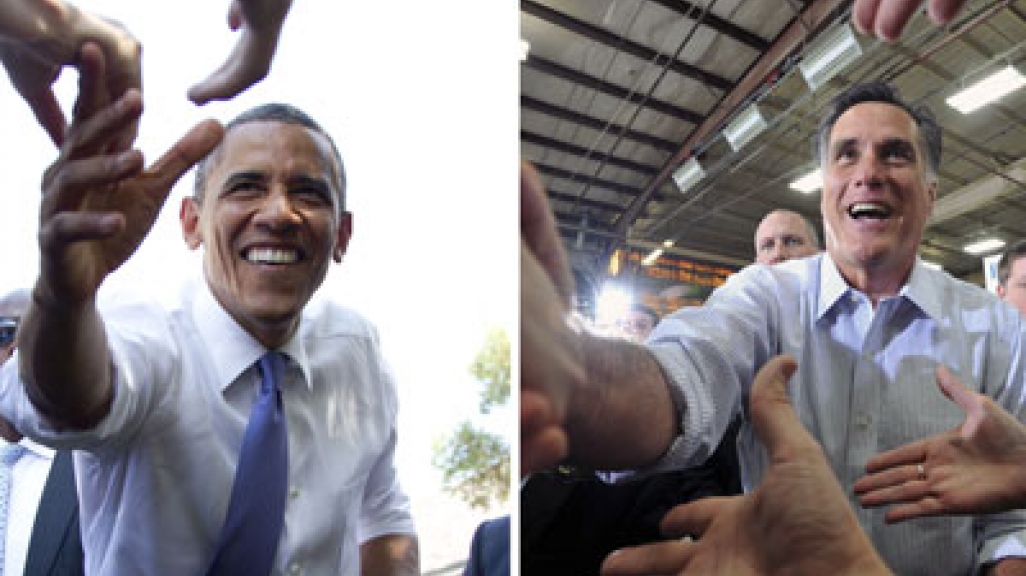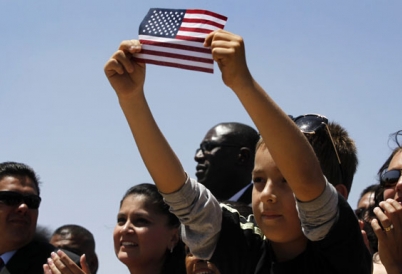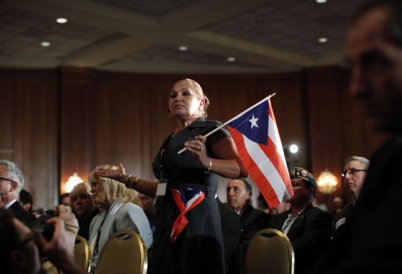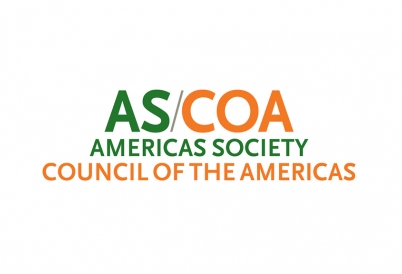Election Guide: The U.S. 2012 Vote
Election Guide: The U.S. 2012 Vote
On November 6, 207 million Americans will be eligible to vote in an election that could see the reelection of President Barack Obama of the Democratic Party or the election of former Massachusetts Governor Mitt Romney, the Republican nominee. Recent polls show a close race, with an October Reuters/Ipsos poll showing candidates tied at 45 percent and a Gallup poll put Romney ahead by 4 points. Latino voters could prove important in deciding the outcome of the race, particularly in swing states. In addition to the presidential race, many states will elect federal congressmembers and state legislators, and 11 states will elect governors.
Get coverage, links, and more about the U.S. election, Latino voters, and Latin America from AS/COA Online.
Nathaniel Parish Flannery and Rachel Glickhouse contributed to this guide.
Image: AP Photo
Quick Facts
- A record 23.7 million Latinos are eligible to vote in the 2012 election, a 22 percent increase from 2008.
- However, Hispanic voter turnout lagged in recent elections. During the 2008 general election, only 50 percent of eligible Latino voters turned out at the polls. In 2000 and 2004, Latino voter turnout stood at around 45 and 47 percent, respectively.
- Top issues for Latino voters include the economy and jobs, immigration, education, and health care, according to an October 8 LatinoDecisions poll. Numerous polls indicate that the economy is one of the most important issues to Latino voters.
- Polls show that Hispanic voters tend to favor Obama. An October 2 CNN poll found that 70 percent intend to vote for the president, while 26 percent support Romney.
- Seventeen percent of Latino voters live in battleground states, while 55 percent of Hispanic voters reside in just the three states of California, New York, and Texas.
- The Hispanic vote will be important in a number of swing states, particularly Colorado, Florida, and Nevada. An October 1 LatinoDecisions poll shows that 63 percent Latinos in battleground states support Obama, while 33 percent plan to vote for Romney. In other states, Democratic support is even higher. In Arizona, for example, 80 percent of Latino voters plan to vote for Obama.
- However, Latino voters account for less than 16 percent of the electorate in the three key swing states of Colorado, Florida, and Nevada.
- About 77 percent of Latinos "definitely plan to vote," reports the Pew Hispanic Center. Read more about the impact of the Latino vote from AS/COA's October 18 panel The Economy vs. Immigration: What Will Unlock the Latino Vote in 2012?
The Importance of the Latino Vote
- Given the fact that over 50 million Latinos live in the United States, Hispanic voters now encompass a key electorate.
- Swing states, which sometimes define the outcome of an election, could go blue thanks to Latinos. Florida in particular is important, given that Latinos account for nearly 20 percent of the state’s eligible voters and the state has had very close presidential races since 1988. Over 30 percent of Florida’s Hispanic voters are Cuban, who tend to vote Republican. But overall Cuban-American support for Republicans decreased around 20 percent since 2000.
- Both candidates have worked to woo Latino voters on the campaign trail, using Spanish-language ads and visiting Hispanic communities. Candidates participated in a forum on Univision to appeal directly to Latinos; see the transcript from Obama and Romney’s appearances on the program.
- Some observers, however, point out that the Latino vote is not homogenous, and Hispanic identity varies widely depending on factors such as country of origin and Spanish-language skills.
Social Media
Numerous organizations are tracking the Latino vote. Follow them on Twitter and Facebook:
- Latino Decisions Twitter and Facebook
- Americas Voice Twitter and Facebook
- Fronteras Desk Twitter and Facebook
- National Association of Latino Elected and Appointed Officials Twitter and Facebook
- Fox News Latino Twitter and Facebook
- Huffington Post’s Latino Voices Twitter and Facebook
- The Hispanic Vote Twitter and Facebook
- Latinos Matter Twitter and Facebook
- Latina Lista Twitter and Facebook
Videos
Watch videos from AS/COA's October 18 panel The Economy vs. Immigration: What Will Unlock the Latino Vote in 2012? This town hall event brought together journalists, pollsters, and policy experts to explore the complex relationship between the Latino electorate and the candidates.
Both candidates have released Spanish-language ads. Watch them here:
Obama’s Spanish videos:
Romney’s Spanish videos:
Both candidates have discussed Latin America throughout the campaign, though as a region it received less attention than others. Here are a sampling of sound bites and policy statements from the campaign trail.
Also, read about how Latin Americans view the candidates based on their positions toward the region in an AS/COA Online News Analysis.
During and prior to the Summit of the Americas in April, Obama spoke about U.S.-Latin America trade ties. In Tampa on April 13, Obama gave an address about the importance of Latin American trade, "Already our exports to the Western Hemisphere are up by 46 percent since 2009," he said. At the Summit, he touted trade, saying "Here in Latin America, the U.S. is the largest foreign investor, and we're the largest customer of manufactured goods from countries across the hemisphere." He added: "We believe that economic partnerships can't just be about nations extracting another's resources," he said. Obama also called for Latin American countries to join the Trans-Pacific Partnership, a proposed free-trade agreement of countries in Asia and the Americas. (Since then, Canada and Mexico joined.) The Democratic platform calls for expanding trade in the Caribbean. Also, when Obama hosted Mexican President Felipe Calderón and Canadian Prime Minister Stephen Harper in April, he said his administration would aim to reduce regulations so as to increase North American trade. During the second presidential debate on October 16, Obama pointed out that he had signed three trade deals; two of these were Colombia and Panama.
During the first presidential debate on October 3, Romney said that a key goal of his government would be to “increase trade, particularly with Latin America.” He echoed this stance during an October 8 foreign policy address, saying Latin American countries wish to “deepen ties with the United States on trade, energy, and security.” He mentioned the issue twice during the second presidential debate on October 16, saying he would "dramatically expand trade in Latin America" and add more free-trade agreements. During the third debate on October 22, Romney spoke about his desire to grow trade with Latin America, saying: "Latin America’s economy is almost as big as the economy of China...Latin America is a huge opportunity for us: time zone, language opportunities." A foreign-policy white paper released by Romney last year describes a plan called the Campaign for Economic Opportunity in Latin America, a “public-diplomacy and trade promotion campaign in Latin America that contrasts the benefits of democracy, free trade, and economic opportunity with the ills caused by the authoritarian model of Venezuela and Cuba." The program would be launched within his first 100 days of office, the paper says, while in the long-term, Romney would create a “Reagan Economic Zone” in the Americas. In August, a top Romney advisor explained the candidate also supports a free-trade zone for the Americas.
In April at the Summit of the Americas, Obama said: “As I’ve said many times, the United States accepts our share of responsibility for drug violence. That’s why we’ve dedicated major resources to reducing the southbound flow of money and guns to the region. It’s why we’ve devoted tens of billions of dollars in the United States to reduce the demand for drugs. And I promise you today—we’re not going to relent in our efforts.”
In his foreign policy white paper, Romney says that "the region is also witnessing an epidemic of violent criminal gangs and drug cartels, which have wrought death and mayhem across much of Mexico, Central America, and the Caribbean." He calls for the creation of the Hemispheric Joint Task Force on Crime and Terrorism to coordinate intelligence-sharing and law enforcement in the Americas. The Republican platform “salute[s] the people of Mexico and Colombia” as allies in the war on drugs.
- Border fence
In January 2011, the Obama administration stopped a program to build a high-tech fence plan on the Mexican border after only 53 miles of the security wall were constructed. Homeland Security Secretary Janet Napolitano said the lesson of the multimillion-dollar program is there is no "one-size-fits-all" solution for border security. In May 2011, Obama said the fence was “basically complete,” adding: "We have gone above and beyond what was requested by the very Republicans who said they supported broader reform as long as we got serious about enforcement. All the stuff they asked for, we’ve done.”
Romney’s foreign policy white paper calls for finishing the construction of the border fence. In the September Republican debate, Romney said: “We got to…have a fence, or the technologically approved system to make sure that we know who's coming into the country.” During an October 2011 speech, Romney said: “Our border with Mexico remains an open sore. Will drug cartels dominate the regions adjoining the United States, with greater and greater violence spilling over into our country? Will we have failed to secure the border and to stem the tide of illegal immigrants? And will drug smugglers and terrorists increasingly make their way into our midst?”
- Security
When Obama hosted Mexican President Felipe Calderón in April, Obama said drug-related violence in Mexico could have a “deteriorating effect” on the United States’ relationship with its southern neighbor. But he added that there was shared responsibility. "When you have innocent families and women and children who are being gunned down on the streets, that should be everybody's problem, not just our problem, not just their problem,” he said, adding: “Criminal gangs and narco traffickers pose a threat to each of our nations. And each of our nations has a responsibility to meet that threat.” Asked about the 2009 to 2011 Fast and Furious operation which led to 2,000 guns moving from the United States to Mexico and falling into the hands of cartels, Obama said in September that the attorney general put a stop to it and that the program began under the previous administration. He also said that those "responsible have been held accountable."
During the September Univision debate, Romney echoed the view of shared responsibility. Asked what security issues he would discuss with Mexican President-elect Enrique Peña Nieto, he said: "I'd tell him that this is a problem that we share, that this is not [only] Mexico's problem. This is also the United States of America's problem…we have a responsibility in this country to reduce drug usage." In his foreign-policy white paper, Romney says he would consider military training and intelligence-sharing in Mexico similar to what was done in Colombia. During the second presidential debate, Romney described the Fast and Furious operation as "the greatest failure we’ve had with regards to gun violence," saying it led to "thousands of guns going to Mexican drug lords."
In April 2012, Obama approved the finalization of a free-trade agreement with Colombia, which went into effect in May. At the April Summit of the Americas in Cartagena, Obama praised Colombia’s economic growth and improved security, as well as the country’s security expertise.
Romney has criticized Obama for not doing enough to support free-trade agreements with Colombia and Panama. Romney’s website says Obama “has squandered valuable time in which to advance free-market principles throughout the region by waiting for three years to present free trade agreements with our allies Colombia and Panama to Congress for ratification.”
In January 2011, Obama eased travel restrictions on Cuba, making it easier for Americans to visit the country and for Cuban-Americans to send remittances to the island. The Democratic platform praises these changes, but says that “going forward we will continue to support the Cuban people’s desire to freely determine their own future.” In response to criticism on the current administration’s Cuba policy from Republican vice presidential candidate Paul Ryan in September, an Obama campaign official said he “has repeatedly renewed the trade embargo with Cuba, pressured the Castro regime to give its people more of a say in their own future, and supported democracy movements on the island.”
The Republican party platform “reject[s] any dynastic succession of power within the Castro family.” It also calls for democratization, independent media, and improved internet access on the island. A January 2012 press release from his campaign read: “Mitt Romney will adopt a clear policy toward the Cuban regime: no accommodation, no appeasement. The United States should not relent until the day when the Castros’ regime meets its end.” In his foreign-policy white paper, Romney says that "Venezuela and Cuba are leading a virulently anti-American 'Bolivarian' movement across Latin America that seeks to undermine institutions of democratic governance and economic opportunity." Romney also cited both countries in an October foreign-policy address, saying Latin American countries “want to resist the failed ideology of Hugo Chavez and the Castro brothers.”
In a July 2012 interview, Obama said that “what Chávez has done over the last several years has not had a serious national security impact on us [in the United States].” He added that, his “main concern when it comes to Venezuela is having the Venezuelan people have a voice in their affairs, and that you end up ultimately having fair and free elections, which we don't always see." The Democratic platform calls for promoting “greater freedom in Cuba and Venezuela until all their citizens enjoy the universal rights they deserve.”
Romney has criticized Obama’s stance on Venezuela, saying it was "disturbing to see [Obama] downplaying the threat posed to U.S. interests by a regime that openly wishes us ill." He added: "Hugo Chávez has provided safe haven to drug kingpins, encouraged regional terrorist organizations that threaten our allies like Colombia, has strengthened military ties with Iran and helped it evade sanctions, and has allowed a Hezbollah presence within his country's borders. And he is seeking to lead – together with the Castros – a destabilizing, anti-democratic, and anti-American 'Bolivarian Revolution' across Latin America." The Republican party platform calls Venezuela a a “narco-terrorist state,” and an “Iranian outpost in the Western hemisphere.”
During a March 2012 meeting with Brazilian President Dilma Rousseff, Obama said “Brazil's extraordinary rise, Madam President, has captured the attention of the world. Put simply, the United States doesn't simply recognize Brazil's rise. We support it enthusiastically.” The Democratic platform highlights the Open Government Partnership, a global initiative co-chaired by the United States and Brazil. On October 24, Obama campaign spokesman Dan Restrepo told Folha de São Paulo not to expect major changes to Brazil policy should the president be reelected. "There was an increase in [U.S.-Brazil] dialogue during the first administration, and I see a continuation of these efforts, to expand commercial ties and increase the number of bilateral initiatives," Restrepo said. He mentioned Obama would be unlikely to change his position on supporting a seat for Brazil on the UN Security Council. He noted that there could be more collaboration on security efforts, given a rise in organized crime in the region.
In October 2011, Romney appointed Clifford Sobel, a former U.S. ambassador to Brazil, to serve as one of his two campaign advisors on Latin American foreign policy. On October 19, a Romney campaign source spoke to Folha de São Paulo, saying that while the candidate infrequently mentions Brazil, the country has a "central role" in Romney's policy for Latin America along with Mexico and Colombia. The source said Romney would potentially support Brazil's bid for a UN Security Council seat if the country reconsidered its relationship with Iran, and that the candidate would explore trade pacts such as reducing subsidies in the United States or exempting bilateral trade from double taxation. "The main objective is...improving trade relations with Brazil. The team understands Brazil's importance, which is the subtext of Romney's message about promoting more trade with the region," explained the source. Romney also supports Brazil as an important partner in anti-drug trafficking efforts and combating trans-national crime.
Obama's Immigration Policy
In June 2012, the Obama administration announced a new policy that would defer deportation of over 800,000 young undocumented immigrants, who could then apply for temporary work permits. Obama called the policy change “a temporary stopgap measure” and hailed the move as “more fair, more efficient and more just.”
Asked at the September Univision forum about this policy, Obama said: “I met young people all across the country, wonderful kids who sometimes were valedictorians, were participating in the community, had aspirations to go to college, some were serving in our military...There's no way you would think it was fair or just for us to have them suffering under a cloud of deportation.” He added that his “biggest failure is that we haven't gotten comprehensive immigration reform done.” Obama also defends the DREAM Act, legislation that would provide a path to legal residency for young undocumented immigrants. It failed to pass Congress in 2010.
Obama’s official government website also explains: “Enforcement resources should be focused on preventing those who would do our nation harm from entering our country. The law should stop punishing innocent young people whose parents brought them here illegally and give those young men and women a chance to stay in this country if they serve in the military or pursue higher education.” The Democratic platform calls for comprehensive immigration reform.
During the second presidential debate on October 16, Obama defended his administration’s policy to “streamline the legal immigration system, to reduce the backlog, make it easier, simpler and cheaper for people who are waiting in line.” He explained that his initiative offered opportunities to undocumented youth while targeting violent criminals. Obama also pointed out that Republicans blocked the DREAM Act, and said Romney supported Arizona’s strict immigration law. He also criticized the concept of “self-deportation,” which Romney espouses.
Romney's Immigration Policy
In an October interview, Romney said: "I actually will propose a piece of legislation which will reform our immigration system to improve legal immigration so people don't have to hire lawyers to figure out how to get here legally.” He also said he would maintain Obama’s deportation deferral policy for youth, promising that "before those visas have expired we will have the full immigration reform plan that I've proposed." However, a Romney aide later explained that “we’re not going to continue Obama’s program. We’re going to replace it and would only honor visas already issued.”
Romney favors reforms that will allow more opportunities for skilled, educated foreigners to immigrate legally. “The United States is currently excluding too many workers who will start businesses, create jobs, foster innovation, and help grow our economy,” his site reads. On his website, he calls for expanding legal immigration for highly-skilled workers and families of citizens and permanent residents, making the temporary worker visa system functional, and tougher enforcement against undocumented immigration.
Romney is critical of the Obama administration’s immigration policy. “Obama has utterly failed to secure the border. And instead of taking a strong stand on illegal immigration, he has ordered immigration officials to enforce immigration laws ‘selectively,’ leading to the dismissal of many deportation cases.”
Romney explained during the second presidential debate that he supports improving the legal immigration system and giving green cards to highly skilled immigrants and those who graduate from college in the United States. While he said he supports giving residency to young undocumented immigrants, he said he opposes amnesty and wants to put a stop to illegal immigration. He defended “self-deportation” but cautioned that he didn’t favor mass deportations. Romney mentioned employment verification twice as a method of immigration enforcement.










